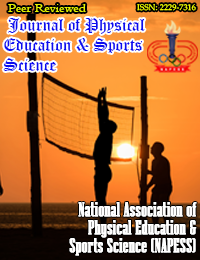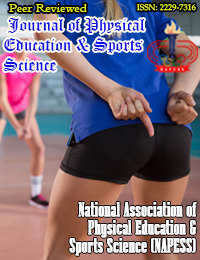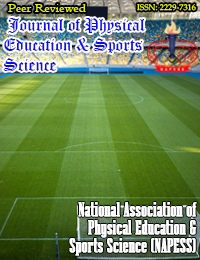ROLE OF RELIGION AND SPIRTUALITY IN SPORTS
Download PDF
In today’s society sport has become more competitive and challenging. The structure of psycho-physical and spiritual aspect is involved in every educational activity. This paper deals with the religion and spirituality in sports and how religion helps an individual to perform at their best and highest level. Best performance is said to be found when the player gets one with the Creator. The connection between the athlete and his/her creator is the link of success that is followed even today. The paper studies the aspects of faith, prayer, the relationship with God and the ethical moral action of the players while playing in any sport. The influence that religion does in the commitment, decision and activities of athletes in the everyday life. The aim of this topic is to explore how one’s religion influences individual’s sports performance and everyday life decisions.
International Conference on “Sports Management and Allied Sports Sciences” -Challenges and Innovations-
ROLE OF RELIGION AND SPIRTUALITY IN SPORTS
Dr. Francis Xavier Lobo
Director of Phy. Edu.(Assoc. Prof)
Rosary College of Commerce & Arts
Navelim, Salcete- Goa.
Abstract
In today’s society sport has become more competitive and challenging. The structure of psycho-physical and spiritual aspect is involved in every educational activity. This paper deals with the religion and spirituality in sports and how religion helps an individual to perform at their best and highest level. Best performance is said to be found when the player gets one with the Creator. The connection between the athlete and his/her creator is the link of success that is followed even today. The paper studies the aspects of faith, prayer, the relationship with God and the ethical moral action of the players while playing in any sport. The influence that religion does in the commitment, decision and activities of athletes in the everyday life. The aim of this topic is to explore how one’s religion influences individual’s sports performance and everyday life decisions.
Keywords: Spirituality of sports, religion, the meaning of prayer, ethical and moral.
Spirituality of Sports: the unique inner search for the fullest personal development through participation in Sports.
Religion: A belief in and worship of a superhuman controlling power, especially a person God or Gods
Prayer: refer to speaking to God or to express thanks or to ask for help request to heal.
Ethical and moral: refers to a system of moral principles sense of right and wrong and good or bad actions.
The research conducted by (Bskljacie, et al) on the attitudes of athletes about ethics in today sports have shown that athletes recognize ethical moments in sports. In terms of what is and what is not moral, but also point to the inability to define and recognize ethical dilemmas in sports. (According to Perak) the testimony of world religious traditions emphasizes the experience of the body as a starting sacred dimension of the universal human activity be it the awakening of Buddha in meditation, Moses vision of the burning bush, Paul’s glare on the road of Damascus or Mohammed publication of the Koran. (Peark, 2010:231). James W. Fowler (1981) considers religiosity universal, regulated, interactive and social. But it all depends on education and the environment. (Tamislav Ivancic) says that religiosity is in every human being as inmate ability to search for meaning and on its basis religion arise. The European values study conducted on the general population in Croatia in 2008 showed that 791 of peoples considered themselves religion to irreligion 4% consider themselves to be atheists and 6% of respondents did not know.
(Cripis and Zrinseak 2010:10) have shown different results like for example research on the religiosity of the young people in Germany studies have shown that 42% of the young people respect the existence of God. The more economically developed country and the greater degree of modernization of society. The lower the proportion of young people who are religious. There is no single definition of religion and spirituality often these terms overlap but there are some visible distinctions between them (Duckic and Kokorid2014:426) Hassed describe spirituality as a universal broader construct that refers to the subjective experience of transcendence that exists outside the religious framework. While religiosity is often characterized by the typical certain rituals within the religious institutions
(Leutar and Leutar, 2010:82) Today the understanding of the religious and spiritual aspects of man is crucial. The inner aspect of man, has spiritual dimension goes beyond the Psychological and somatic area. Ivancic reveals that the spirit tends to his development, but a man experiences the greatest frustration if he does not develop in a its aspects. (Parryet al in their book sport and spirituality an introduction say that sports can be presented through the many aspects of human work but also say that the spiritual dimension is the base for participation and success in the sports. As scientist experts the authors observe sports spirituality through the lens of Psychology, ethics, theology and contemporary spirituality. (Parry Nesti, Robinson ad Watson, 2007) Many sports sociologist in their studies recognize the interaction between sport and religion and the importance of religion and spirituality in the life of Athlete..
(Hoffman, 199, Stevenson 1991, according to Watson al Czech 2005: 26) Watson and Nesti 2005 discuss spirituality in sports Psychology, describing that spirituality can be understood in the context of sport and that it may be included in relationship of counselling and mental preparation. For (Kucic and Spehnjak) it is important that a person develops the physical, intellectual and spiritual aspect as it builds and develops as the complete personality. (Kucis and Spehnjak, 2015) It is not enough to accept sports activities only as a physical category to achieve sports results but also to accept it as a spiritual moral category as it then becomes a source of joy, satisfaction, fulfilment and purpose.
(Baskljocic) warns of various temptations of the utilitarian approach which in sport present various risk, such approach can lead to the development of double standards, today young athletes are exposed to distinct physical and psychological stress, demanding training and high expectation. Toda, scientist conducts numerous researches on the effects of prayers as spiritual help to overcome stressful situations, training, competition, fears and their own borders. The research on the religiosity of athletes according to Kucis and Spehnjak have showed that 86%of respondents pray always or sometimes before their performance. This initiative, brings about change in their decision and the moral good, self-giving, self-control, perservance, sense of duty, positive speech, sacrifice, fair play, trust, faith, love, over caring egoistic aspirations.
The causes of drinking, drugs, gambling, nervousness, restlessness, resentful and out of control and with no limits. The centre of the interpersonal aspect is the area of the essence of the spiritual dimension of man is the steady growth and development.
It is impossible to fight against the negative habits but by perservance on everyday basis and step by step building of the positive habits. The negative ones will be eliminated. In sportsman not only wins the competition but he must conquer himself and his shortcomings to reach the unprecedented possibilities and his spiritual aspect enables him to do so.
The modern man rejected the notion of sin and sometimes backward and restrictive. But Jesus says “Whoever commits sin is a slave of sin (John 8:34) since the slave is not free, he cannot break free on his own, but he needs deliverance. “ What is impossible with man is possible with God” (Mt 19:26) The European values study in 2008, showed that 60% of Catholics believe in sin. (Blaievic, 2014:23) (Higles 2016. 16) points out that “The greatest danger of our time is the relativisation of everything. Good and evil have become the matter of the personal choice by doing so he has disabled himself to hear the spiritual soul.
Innner spiritual strength. Pope John Paul II in the encyclical Salvifict Dolaris emphasis that spiritual suffering is far more difficult that mental and physical suffering. Doctor Hipton points out that the positive thoughts have huge effects on the genes only they are in accordance with the subconscious mind. Negative thoughts also have equally powerful effects on the mind. The task of every individual is to recognize their value, discover their originality and means of existence such a man will enrich the sports by being himself and with his gifts and the sport will become an art. The greatest achievement of the ability is the highest level of the capability of the human spirit.
Religion and spirituality play a very important role in any athlete’s life. We might have seen any sports player make a small prayer before going into the game. A bike rider knows that a small mistake can put his life in danger, an athlete knows he might get a cramp or any such incident might take place while running, a martial arts player knows he get injured or severely injured or even knocked out, a swimmer is prepared knowing that he might get suffocated in water. There are life risks in any sports that is why a sport player always remembers his Creator and goes forward taking the name of his Creator. Sport also helps us to understand our selves better by letting us know or weaknesses and our strengths. Through sport we get to develop our relationship with our Creator and also our spiritual selves. While playing a sport or before entering any sport a player is well prepared for victory, if not victory than he/she is prepared for the defeat keeping in mind that “next time I will give a better performance”
The article by Cipriani, R. (2012) manages the connection among game and (spi)rituality from an anthropological and sociological perspective. There are a few assemblies yet additionally numerous contrasts between the two circles. In any case, the affinities give off an impression of being more various and important than the divergences. Specifically the presence of petition during games is pushed to frontal area the thought of games as a representation of life. Another huge job is played by images whose strict substance is apparent. The creator alludes, especially, to the meaning of the commitment made by Turner's way to deal with the progress from custom to scene (or theatre).
In the survey conducted 208 respondents, with regard religion of spirituality 53% male and 46% female Zagrev handball players in relation to faith, prayers, ten commandants, forgiveness. It indicated that high level of satisfaction among other things includes the religious and spiritual development of the athletes as well as the commitment to good. Starch, Roberti, Branata, (2004) who found that athletes are more religious than non-athletes (Terry Onas Egli, 2013. 58) One of the causes of great religiosity of the athlete lies in the fact that sport today has become highly profitable. Only those who play can face challenges beyond their limits and possibilities.
What establishes delight throughout everyday life? Ideal Experience: Psychological Studies of Flow in Consciousness offers a complete study of hypothetical and observational examinations of the "stream" insight, an alluring or ideal condition of awareness that improves an individual's mystic state. "Stream" can be said to happen when individuals can address the difficulties of their current circumstance with suitable abilities, and as needs be feel a feeling of prosperity, a feeling of dominance, and an increased self-appreciation regard. The creators show the assorted settings and conditions wherein stream is accounted for in various societies (for example Japan, Korea, Australia, Italy), and portray its positive enthusiastic effects. They consider the idea of stream versus current social constructions, chronicled wonders, and developmental biocultural determination. The manners by which the capacity to encounter stream influences work fulfilment, scholarly achievement, and the general personal satisfaction are recommended; and the childrearing rehearses that bring about the capacity to get happiness from life, thought of.
The search for meaning, orientation towards good and ethical moral action can be maximized
through sports activity and realised only if the person is fully developed through psycho – physical and spiritual aspects on the other hand emphasizes on material goods and personal benefits are visible indicators of lack of insufficient sports spirituality.
When we have a look or peek into what actually motivates people to get involved sports activities we will find out from studies how people are motivated by feelings of personal well-being, competition and enjoyment. When involved in sports people can vent out their frustration and also make their relationship with their creator stronger. The paper written by Margaret R. Boniface talks about the ‘positive experience phenomena’ also termed as peak experience, peak performance and flow. Flow is referred a state where you allow your emotions to flow out of your mind. This helps in cleansing your mind from unwanted thoughts and emotions like anger, depression. This flow is experienced in adventurous activities like sports. This flow helps also to lighten up ourselves and make us worry free and jolly go lucky people. Sports also help in developing an optimistic approach toward life. This optimistic approach is further connected with wellbeing of one’s spiritual self.
Collins, M. (2014) explains how Forms of sport and forms of religion are near-global phenomena. This article starts by summarising participation in both domains, and the benefits to individuals and society arising therefrom in terms of health, social capital and wellbeing. Sport is such a major social activity that some have suggested it also is a religion. This I refute; but it is an aspect of popular passion, an implicit religion. I t is also recovering more links now with religious practice, after three-quarters of a century of decline. Both generate a large volume of social activity and capital, and contribute positively to health and wellbeing. Dav id Cameron, interested in measuring what truly matters to people, instituted a major new survey. He also espoused the idea of the "Big Society, "as a growth of freedom for local social development, which received a mixed response in the light of broader government policies for cutting public expenditure. With sport as one of the largest segments of volunteering, one might think here was potential for it to take on an even more significant role, but (this paper suggests) there are reasons for significant limits to the further development of its potential importance.
Conclusion
Thus this paper explains how sports and spirituality are interrelated. The paper also highlights the importance of religion and spirituality of athletes. It also reflects that sports activity is not only related to physical fitness and activity but helps to develop highly spirited soul. Man is a psycho physical as well as spiritual being. It is the spirit that enables the man to communicate with God. (Ivanicic, 2016a).
References
- Safarie,A(2012)Filozofija sporta,Bjelovar, Amanita
- Blazevic. J (2014) New Age i krscanstvo. Enciklopedijski prirucnik, Verbum, Split
- Jukic, J (1997) Lica i maske svetoga. Ogledi iz drustvene religiogije KS Zagreb
- Ivan Pavao II. Salvifici doloris, Krscanska sadasnjost, Zagreb.1990
- Ivancie T(2016b). Molitva koja lijeci. XX izdanje. Teovizija, Zagreb.
- Boniface, M. R. (2000). Towards an understanding of flow and other positive experience phenomena within outdoor and adventurous activities. Journal of Adventure Education and Outdoor Learning, 1(1), 55–68.
- Cipriani, R. (2012). Sport as (Spi)rituality. Implicit Religion, 15(2), 139–151.
- Collins, M. (2014). Sport, religion, wellbeing, and Cameron’s big society. Implicit Religion, 17(2), 139–163.
- Csikszentmihalyi, M., & Csikszentmihalyi, I. S. (Eds.). (1992). Optimal experience: Psychological studies of flow in consciousness. New York, NY: Cambridge University Press.

















